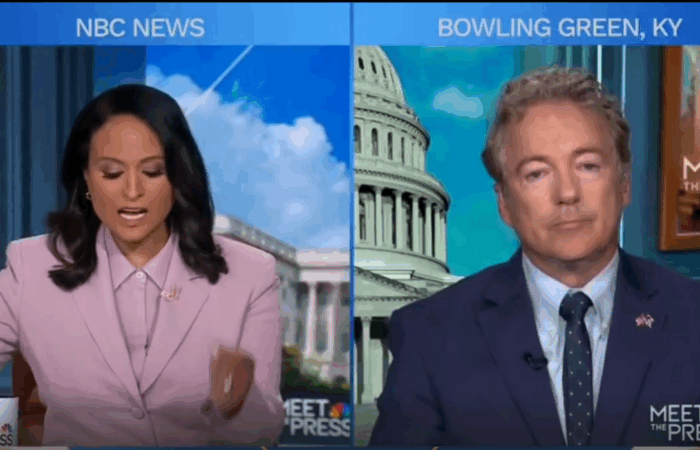
During an appearance on NBC’s Meet the Press, Senator Rand Paul (R-KY) retracted his previous criticisms of President Trump’s 2025 budget proposal, which he had earlier condemned as “immoral” and fiscally irresponsible.
In context, Rand has been moderating his initial position, suggesting that he may be returning to a more rational viewpoint and receiving nothing from President Trump. Rand indicates that he is open to negotiations to secure his support for the crucial bill.
At the beginning of the discussion, the journalist prompted Rand to clarify his views on Trump’s budget. She remarked, “You have been one of the most vocal Republican critics of President Trump’s tax and spend Bill, which he refers to as the big, beautiful bill. You have stated that it raises the debt ceiling excessively.”
Continuing her inquiry, she cited the president and directly questioned Rand about his stance on the big beautiful bill. She pointed out, “Trump referred to you as ‘The toughest vote in the history of the US Senate.’ Senator, let me ask you: as of today, are you a ‘yes’ on this bill or a ‘no’?
In response to Trump’s comments, Rand stated, “I view that as a compliment, and I spoke with the President last evening after the parade, and we are working towards a more constructive dialogue, and I have communicated to him that I am not an absolute no. I can be a yes. I appreciate the tax cuts.”
Clarifying his stance, the Republican expressed, “I actually concur with Art Laffer and supply-side economists that often, when we reduce rates, we actually generate more revenue. Therefore, I do not have significant issues with the tax cuts. I believe there should be additional spending cuts, but if they desire my vote, they will need to engage in negotiations, as they are reluctant to vote for a $5 trillion increase in the debt ceiling, you know.”
Congress is notoriously poor with finances, and thus, they should be provided with a more limited credit line rather than an expansive one. Yes, the debt ceiling must be raised, but what I propose is that it should increase in three-month increments, followed by a renewed discussion regarding the debt.
In conclusion, he remarked, “We should not raise it by 5 trillion and then wait two years, endure another election cycle, and find ourselves nearing the end of the Trump administration, only to realize, Oh, we have accumulated a significant amount of debt. We ought to have managed this better. I believe we should continue discussing it.”
Clarifying his stance, the contentious senator stated, “I am willing to endorse the ‘Big, Beautiful Bill’—but only if it does not authorize a $5 trillion increase in the debt ceiling. I played a role in drafting the Trump tax cuts and wish to see them extended. However, Congress must implement gradual increases that control spending and confront the uniparty’s dependency on debt.”


